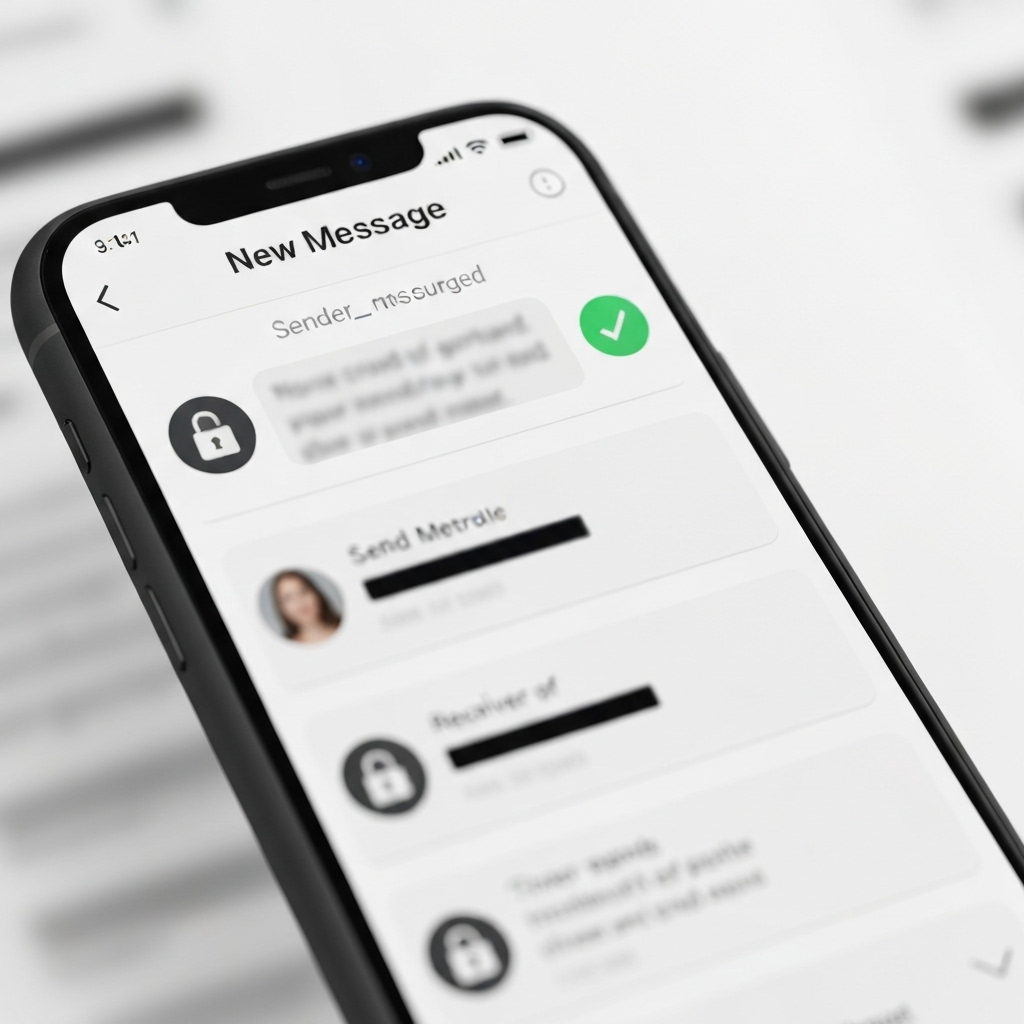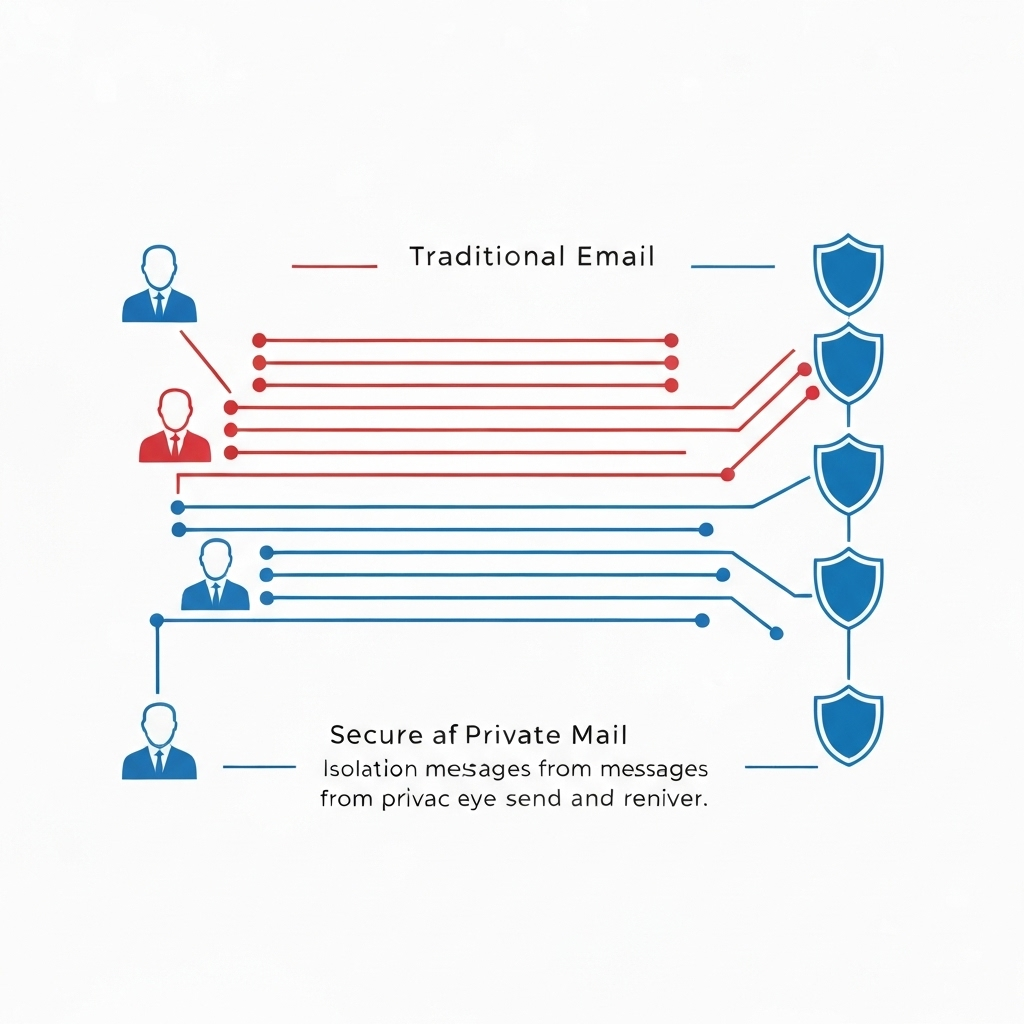Secure Your Communications: The Power of Private Mail

In our hyper-connected world, communication flows faster and more freely than ever before. We share thoughts, ideas, and sensitive information across vast digital networks daily. Yet, this constant stream of data comes with an often-unseen cost: the erosion of our privacy. From personal secrets to critical business data, the channels we use to communicate are increasingly vulnerable. This growing concern has brought the concept of private mail to the forefront, not as a niche technology, but as a fundamental necessity for safeguarding our digital lives. But what exactly constitutes 'private mail,' and how can we ensure our conversations remain truly confidential?
The digital landscape is littered with potential threats, from sophisticated hackers and intrusive corporations to overreaching surveillance. Standard email, while convenient, was not built with robust privacy in mind. This has led many to seek out solutions that offer a higher degree of security and confidentiality. This article will delve into the world of private mail, exploring its importance, the risks associated with insecure communication, the essential features of secure solutions, and practical steps you can take to enhance your own digital privacy.
What Exactly is Private Mail? Beyond Basic Encryption
When we talk about private mail, we're referring to more than just sending an email that happens to be encrypted during transit. While Transport Layer Security (TLS) encryption, commonly used by major email providers, protects your message between your device and their server, it doesn't protect it once it's on the server, nor does it prevent the provider from accessing your data. True private mail goes much further, aiming to ensure that only the intended sender and recipient can access the message content, and that the provider itself has minimal visibility into your communications.
Here are the core components that define robust private mail solutions:
- End-to-End Encryption (E2EE): This is the gold standard. E2EE ensures that messages are encrypted on the sender's device and can only be decrypted by the intended recipient's device. The service provider, or any intermediary, cannot read the content of your messages, even if they wanted to. This is a significant step up from standard TLS encryption, which only encrypts data in transit.
- Zero-Knowledge Architecture: This principle means that the email provider does not possess the keys required to decrypt your messages. Your data is encrypted in a way that the service itself cannot access its content. This ensures that even if the provider's servers are compromised, your sensitive messages remain unreadable.
- Minimal Data Logging: Reputable private mail services are transparent about the data they collect, and typically, this is kept to an absolute minimum necessary for service operation. This might include metadata like the time of sending or receiving, but crucially excludes the content of your messages and often goes to lengths to anonymize or omit other identifying details.
- Secure Storage: Beyond encryption, how your data is stored is also critical. Private mail services often employ advanced security measures for their servers, including physical security, network hardening, and robust access controls, to protect any stored data from unauthorized access.
- Privacy-Focused Policies: A commitment to user privacy should be evident in the provider's terms of service and privacy policy. This includes clear statements about data ownership, how data is handled, and resistance to unwarranted data requests from third parties.
Essentially, private mail is about building a secure enclave for your digital correspondence, where you retain control over who sees your messages and how your data is handled. It's about fostering confidential communication in an era where privacy is increasingly under siege.
The Risks of Insecure Communication Channels
The convenience of standard email and messaging services often lulls us into a false sense of security. However, the risks associated with using insecure communication channels are substantial and can have far-reaching consequences for individuals and businesses alike.
1. Data Breaches and Information Theft: Major data breaches occur with alarming frequency. In 2023 alone, millions of records were compromised globally. When your email account is breached, attackers gain access to a treasure trove of personal information. This can include financial details, login credentials for other services, personal identification information, private conversations, and sensitive documents. The average cost of a data breach for businesses continues to rise, often reaching millions of dollars, but the personal cost to individuals can be even more devastating.
2. Identity Theft: Stolen personal information from insecure emails is a primary vector for identity theft. Attackers can use your Social Security number, date of birth, address, and other details to open fraudulent accounts, take out loans in your name, or commit other crimes, leaving you to deal with the financial and legal fallout for years.
3. Surveillance and Snooping: Whether it's governmental agencies, corporate entities, or malicious actors, there are entities actively seeking to monitor digital communications. Insecure channels make it easier for unauthorized parties to intercept and analyze your messages, potentially exposing private thoughts, business strategies, or personal relationships. This lack of privacy can stifle open communication and create an environment of distrust.
4. Corporate Espionage and Loss of Competitive Advantage: For businesses, insecure email communications can be catastrophic. Sensitive R&D data, client lists, merger and acquisition discussions, or internal strategic plans can be intercepted by competitors, leading to a significant loss of competitive advantage and financial damage. The trust of clients and partners can also be severely eroded if their confidential information is not adequately protected.
5. Reputational Damage: A public data breach or the leak of sensitive personal or business communications can cause irreparable damage to an individual's or company's reputation. Rebuilding trust after such an event is a long and arduous process.
6. Exposure of Sensitive Personal Information: Beyond financial and identity risks, insecure channels can expose highly personal information, such as medical details, private relationships, or confidential opinions, which can lead to embarrassment, blackmail, or emotional distress.
Understanding these risks underscores why prioritizing data privacy and adopting secure communication methods like private mail is no longer optional but a critical safeguard in our digital lives.
Key Features to Look for in Private Mail Solutions
Choosing a private mail provider requires careful consideration of several key features that differentiate truly secure services from those that offer only superficial protection. When evaluating your options, keep the following in mind:
1. Robust End-to-End Encryption (E2EE): This is non-negotiable. Ensure the provider implements strong, well-vetted E2EE protocols, such as OpenPGP. This guarantees that only you and your intended recipients can read your messages. Look for providers that make encryption seamless and automatic for conversations between users of the same service, and offer clear methods for encrypting messages to external recipients if needed.
2. Zero-Knowledge Encryption: As mentioned, this means the provider cannot access your decrypted data. This is crucial for ensuring your privacy, as it means even if the provider were compelled by a legal order or suffered a breach, your message content would remain inaccessible to them.
3. Strict No-Logs Policy: A provider should clearly state that they do not log your activity, especially message content, IP addresses, or browsing habits. A transparent logging policy is a hallmark of a privacy-focused service.
4. Secure Server Infrastructure and Jurisdiction: The physical and digital security of the provider's servers is paramount. Look for providers that operate in countries with strong privacy laws and have a proven track record of security. Understanding where your data is stored is part of a comprehensive data privacy strategy.
5. Open-Source Code: Services that make their code open-source allow security experts worldwide to audit it for vulnerabilities and backdoors. This transparency builds trust and ensures the security claims are verifiable.
6. Strong Authentication and Access Controls: Beyond passwords, look for support for two-factor authentication (2FA) or multi-factor authentication (MFA) to add an extra layer of security to your account. Features like session timeouts and remote logout capabilities are also beneficial.
7. User-Friendly Interface and Features: While security is paramount, a secure email service should also be practical for daily use. Features like easy contact management, search functionality, and mobile apps can significantly enhance usability without compromising security.
8. Transparent Privacy Policy and Business Model: Understand how the provider makes money. Services that are free might monetize your data or show you ads. Paid services often have a business model aligned with user privacy, as their revenue depends on providing a trusted service. A clear, concise, and understandable privacy policy is essential.
9. Secure Storage and Data Handling: Beyond email content, consider how the provider handles attachments and other stored data. Features like password-protected emails or self-destructing messages can add further layers of control over your private correspondence.
By prioritizing these features, you can select a private mail solution that effectively protects your communications and aligns with your commitment to data privacy.
Practical Tips for Enhancing Your Private Mail Practices
Adopting a private mail service is a significant step, but maintaining strong digital security involves ongoing practices and vigilance. Here are actionable tips to enhance your personal inbox security and overall communication privacy:
1. Choose Wisely: Select a Reputable Private Mail Provider: Do your research. Look for providers that meet the criteria outlined above. Services like Proton Mail and Tutanota are often cited for their strong encryption and privacy features. For business needs, solutions that offer robust security alongside professional features are key. Consider how the provider's features align with your specific communication requirements.
2. Master Your Passwords: Strength and Uniqueness Are Key: Never reuse passwords across different services. Use a strong, unique password for your private mail account. Consider using a reputable password manager to generate and store complex passwords securely. A strong password is your first line of defense.
3. Enable Two-Factor Authentication (2FA): This is one of the most effective ways to secure your account. Even if your password is compromised, 2FA requires a second form of verification (like a code from your phone or a security key) to log in, making it much harder for unauthorized users to access your inbox.
4. Be Mindful of What You Share: The Human Element: Even with the strongest encryption, the content of your messages is only as secure as your own discretion. Avoid sending extremely sensitive information (like bank account numbers or highly confidential secrets) via email, even a secure one, if there are safer alternatives or if the risk of exposure is too high. Think critically about the necessity of sharing certain data digitally. For sensitive business discussions, consider the best channels for confidential communication.
5. Understand Encryption Levels and Limitations: Know the difference between TLS (in transit encryption) and E2EE (end-to-end encryption). While TLS is standard, E2EE offers superior protection. If corresponding with someone using a less secure service, your message might be less secure once it reaches their inbox. Be aware of these limitations.
6. Secure Your Devices: Your computer, smartphone, and tablet are the gateways to your email. Ensure all your devices are protected with strong passwords or biometric locks, run up-to-date operating systems and software, and have reputable antivirus/anti-malware protection installed. Mastering professional mails also means ensuring the devices you use to send them are secure.
7. Manage Your Digital Footprint: The less personal information you share online across various platforms, the less data there is to be compromised. Regularly review your privacy settings on social media and other online services. A smaller digital footprint means fewer potential points of failure for your data privacy.
8. Recognize and Avoid Phishing Attempts: Phishing emails are designed to trick you into revealing sensitive information or clicking malicious links. Be skeptical of unsolicited emails asking for personal details, containing urgent requests, or with suspicious attachments or links. Your personal inbox security depends on your ability to spot these threats.
9. Regularly Review Security Settings and Account Activity: Periodically check your email account's security settings and review recent login activity. Most providers offer logs of logins, allowing you to spot any suspicious access attempts. Implementing better email management practices, like those discussed in boosting productivity, can also help you stay on top of your inbox and identify anomalies more easily.
By integrating these practices into your daily routine, you can significantly strengthen your private mail security and contribute to a more robust overall data privacy posture.
How Private Mail Contributes to Overall Data Privacy
In today's interconnected world, data privacy is not just about securing one aspect of your digital life; it's about building a comprehensive shield around your personal and professional information. Private mail serves as a foundational pillar in this broader strategy, offering critical protection for one of the most common and sensitive forms of digital communication.
Email accounts are often central hubs for our digital identities. They store not only correspondence but also act as recovery points for forgotten passwords, contain financial transaction confirmations, hold personal documents, and capture private thoughts and plans. When these accounts are compromised due to insecure communication channels, the repercussions extend far beyond a single lost message.
By adopting private mail solutions, individuals and businesses take a proactive stance against the pervasive data collection and potential surveillance that characterizes much of the digital ecosystem. It means:
- Protecting Sensitive Personal Information (PII): Your private emails can contain details about your health, finances, relationships, and beliefs. Securing these communications prevents this PII from falling into the wrong hands, thus mitigating risks like identity theft, blackmail, or targeted harassment.
- Safeguarding Business Intellectual Property: For companies, email is a primary channel for internal strategy, client communications, and proprietary information exchange. Using secure email ensures that trade secrets, client data, and strategic plans remain confidential, protecting competitive advantage and client trust.
- Reducing Reliance on Data-Monetizing Platforms: Many free email services operate on business models that involve collecting and analyzing user data for advertising or other purposes. Private mail services, particularly paid ones, typically align their business model with user privacy, meaning your data is less likely to be exploited.
- Empowering Digital Autonomy: Ultimately, securing your communications with private mail is an act of reclaiming control over your digital life. It allows for more open and honest expression without the constant fear of surveillance or data exploitation, fostering a sense of digital autonomy.
- Enhancing Overall Security Hygiene: The discipline required to maintain secure email practices, such as using strong passwords and 2FA, often spills over into other areas of digital security, encouraging a more cautious and secure approach to online activities in general.
In essence, securing your email is not an isolated task; it's a critical component of a holistic data privacy strategy. It fortifies a vital communication channel, making it harder for unauthorized parties to gain access to the sensitive information that underpins our personal and professional lives.
The Future of Secure Communication and AI
The landscape of digital communication is in constant flux, and the future promises even more sophisticated tools and evolving threats. Artificial Intelligence (AI) is poised to play a dual role: as a potent weapon for attackers and a powerful ally for defenders of data privacy and confidential communication.
We are already seeing AI-powered phishing attacks that are more convincing and personalized than ever before. These sophisticated attacks can mimic legitimate communication styles and even reference personal details to trick unsuspecting users. Furthermore, AI can be used to accelerate the process of brute-force attacks or to find vulnerabilities in encryption algorithms if not properly implemented.
However, AI also offers immense potential for enhancing security. AI algorithms can analyze vast amounts of data to detect anomalous patterns that might indicate a security breach or a phishing attempt in real-time. They can automate the process of identifying and quarantining malicious emails, flag suspicious links, and even help users manage their security settings more effectively. For professionals juggling multiple communication channels and sensitive data, an ai executive assistant can be invaluable. These platforms can help streamline your workflow, manage your digital correspondence securely, and ensure that privacy is maintained across all your communications, acting as a crucial layer of support in safeguarding your digital life.
The development of new encryption methods, including post-quantum cryptography designed to resist attacks from future quantum computers, is another frontier. Decentralized communication protocols and blockchain-based solutions are also being explored as ways to create more resilient and user-controlled communication networks, further enhancing private correspondence.
As AI becomes more integrated into our daily tools, the focus will shift towards ensuring that these AI systems themselves are secure and privacy-preserving. This means developing AI that can manage and protect sensitive data, rather than exploit it. For instance, AI can help optimize the management of secure email accounts, learn user preferences for privacy settings, and even assist in drafting secure messages. Tools like an ai executive assistant can help streamline your workflow, manage your digital correspondence securely, and ensure that privacy is maintained across all your communications.
The future of secure communication will likely involve a multi-layered approach: strong encryption, vigilant user practices, AI-driven threat detection, and intelligent tools designed to simplify and secure our digital interactions. Embracing these advancements is key to maintaining our data privacy in an increasingly complex digital world.
Conclusion: Securing Your Digital Conversations
In an age where our lives are increasingly lived online, the security and privacy of our communications have never been more critical. The convenience of standard digital tools often belies significant risks, including data breaches, identity theft, and pervasive surveillance. This is where the power of private mail truly shines.
Moving beyond basic encryption, true private mail solutions offer end-to-end encryption, zero-knowledge architecture, and minimal data logging, providing a robust shield for your sensitive information. They are essential tools for anyone concerned about their data privacy, from individuals safeguarding personal secrets to businesses protecting proprietary data and client confidentiality.
The journey to securing your digital conversations involves making informed choices. By understanding the risks, identifying key features in secure providers, and adopting practical security habits like strong passwords, 2FA, and mindful communication, you can significantly enhance your personal inbox security. Remember, your digital privacy is an ongoing effort, not a one-time setup.
As technology evolves, so too will the methods used to protect and compromise our data. Embracing tools like secure email and encrypted messaging, and staying informed about emerging trends, including the role of AI in both security and its potential risks, is crucial. Let this be your call to action: take control of your digital communications today. Prioritize confidential communication, explore the benefits of private mail, and build a more secure digital future for yourself and your organization.



